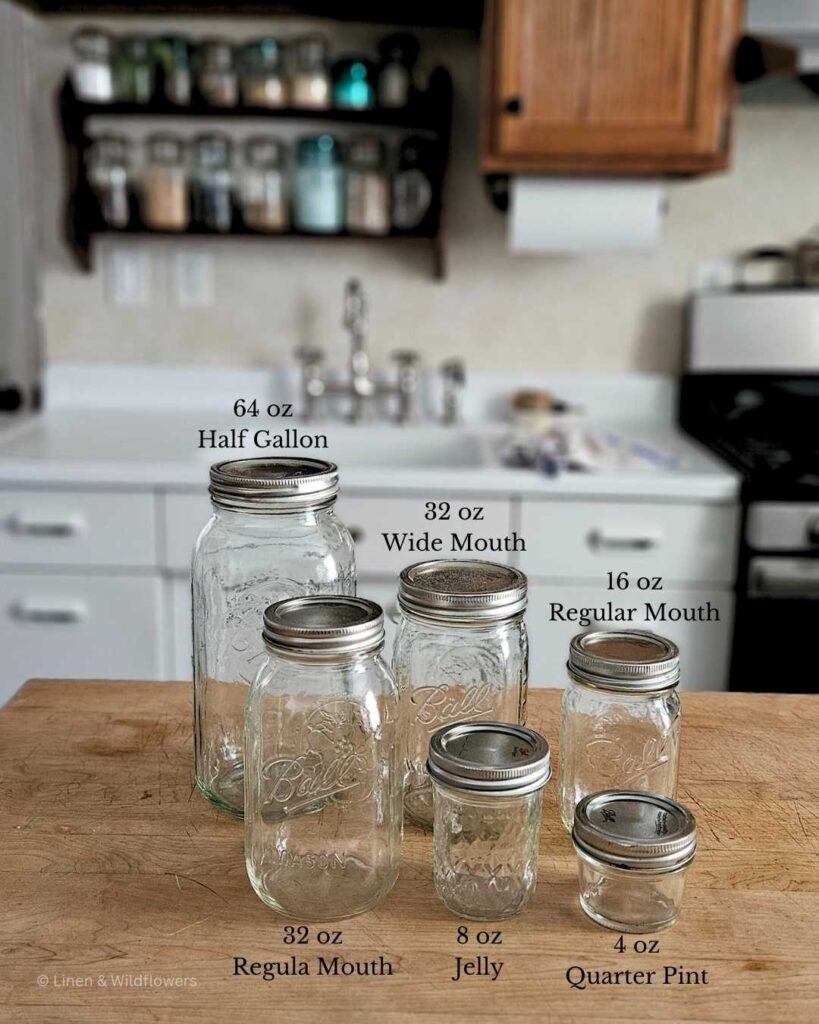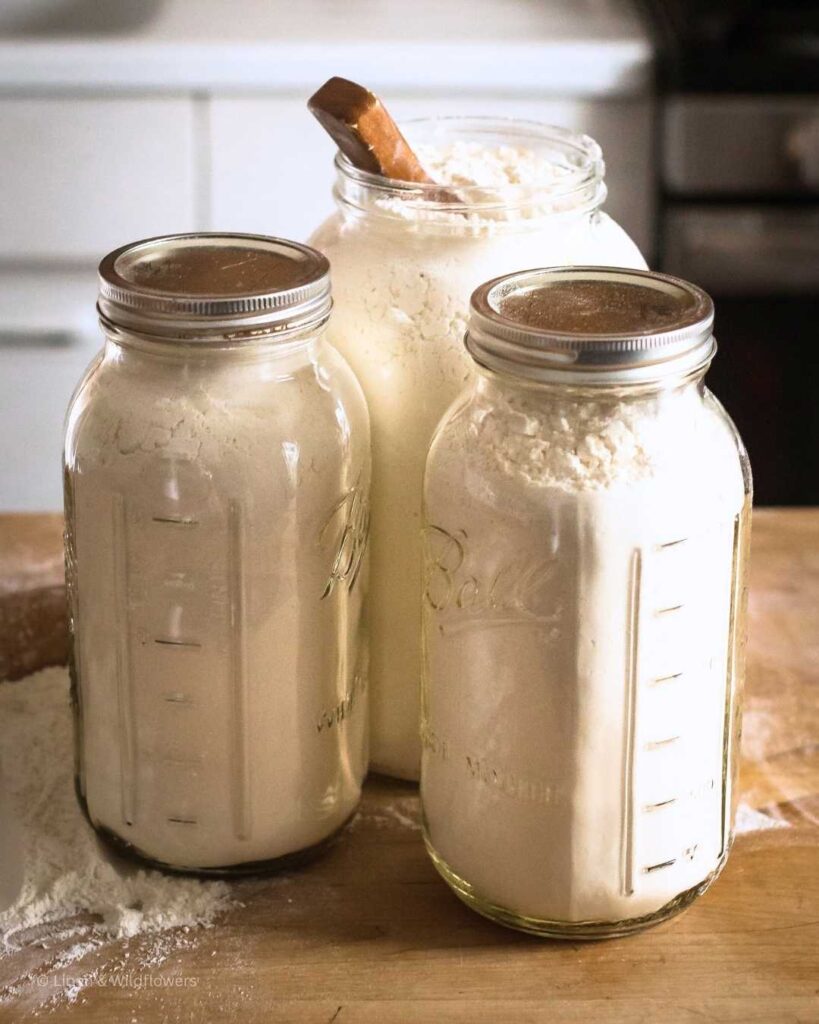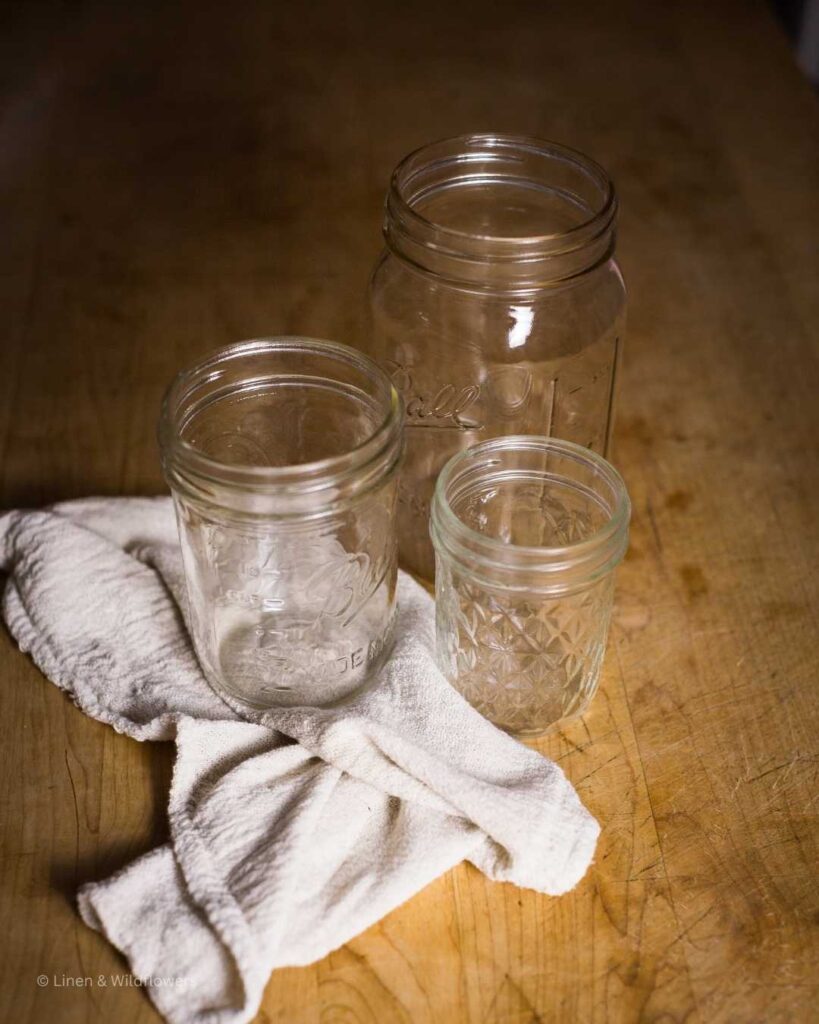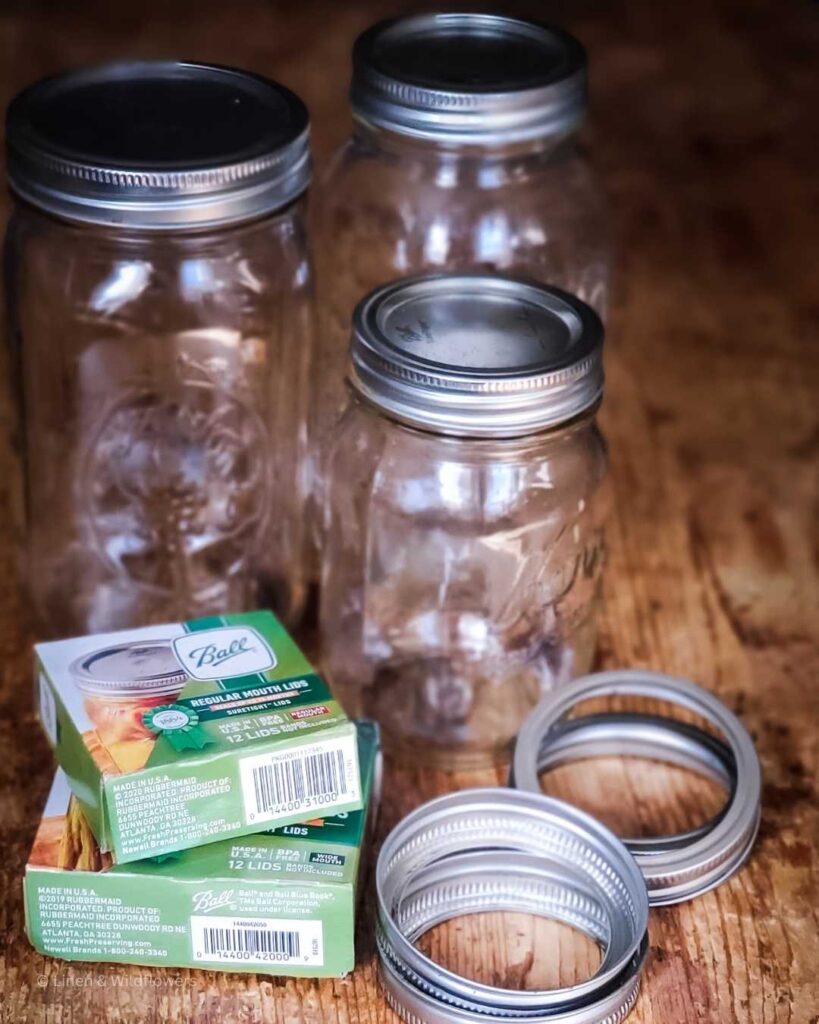Discover the art of preserving perfection with this Guide for How to Choose the Right Size Mason Jar. From 4-ounce delights to half-gallon wonders, find the perfect jar size for your canning adventures and elevate your homemade creations. Uncover practical tips for selecting the ideal mason jar size tailored to your needs.
Unlock the secrets of successful canning and storage by learning ‘How to Choose the Right Size Mason Jar.’ This comprehensive guide covers everything to find the perfect fit for your preserves, pickles, and pantry with tips and insights. Elevate your kitchen skills and embark on a journey of culinary creativity. If you walk into my kitchen, you will find a large assortment of mason jars as well as vintage glass jars.

As an Amazon Associate, I earn from qualifying purchases, and this post contains affiliate links to products I love ♥ See my full disclaimer here!
In our home, we use them for beverages, storing leftovers, and dry goods. By using mason jars, we feel confident that our food will stay fresh. The airtight seals and durable construction of these jars not only preserve the flavors of our homemade creations but also add a touch of rustic charm to our pantry shelves. From colorful jams to neatly organized grains, mason jars have become an essential part of our kitchen, seamlessly combining functionality with a timeless aesthetic. Their versatility extends beyond mere storage; they symbolize a commitment to sustainable living and the joy of savoring the goodness of each culinary endeavor.
- Select a mason jar size based on your intended use.
- Did you know you can purchase Masontops Products?
- Shop this Post!
- A Guide to Choosing the right Jar Size for Your Needs
- Considerations for Choosing
- Commonly Asked Questions
- Tips for using mason jars
- Bonus (Important) Tip:
- 5 Creative Ways to Use Mason Jars
- Final thoughts…
Select a mason jar size based on your intended use.
For beverages or preserves, smaller sizes like 8 or 16 ounces work well, while larger ones, such as quart or half-gallon, are suitable for bulk storage or pickling. Consider your storage space and the quantity of items you plan to preserve when making your decision. Choose from various sizes that align with the quantity of food or beverages you plan to store, ensuring practicality for your specific needs.

4-ounce Jars (Quarter Pint)
A quarter-pint jar is a good size for Single-servings of jams, jellies, or small quantities of sauces. Ideal for gift-sized portions or samples in small jars.
8-ounce Jars (Half pints & Jelly Jars)
Half-pint jars are commonly used for Small batches of jams, pickles, or sauces. Suitable for individual servings or smaller quantities of homemade gifts.
16-ounce Jars
Regular & wide mouth mason jars are used for Medium-sized batches of jams, sauces, or pickles. Great for preserving seasonal fruits and vegetables in moderate quantities.
32-ounce Jars (Quart)
Quart jars are the perfect size for Larger batches of preserves, pickles, or sauces. Excellent for storing bulk items like dry goods, grains, or pantry staples.
64-ounce Jars (Half-Gallon)
Half gallon jars are best for Extra-large batches of pickles, fermenting, or storage of large quantities of liquids. Useful for bulk canning or organizing pantry staples.
Did you know you can purchase Masontops Products?
The best thing about canning jars, you can purchase additional screw bands, straw lids, regular lids and so much more. Just make sure to select the correct lid size!
Shop this Post!
A Guide to Choosing the right Jar Size for Your Needs
When it comes to preserving, storing, or gifting homemade delights, the right mason jar size plays a crucial role. Here’s a comprehensive guide to help you navigate the diverse sizes and find the perfect fit for your needs.
The Delightful Sampler: 4-Ounce Jars
Ideal for: Single-servings of jams, jellies, or sauces. Perfect for: Gift-sized portions, samples, or individual servings.
The Versatile Workhorse: 8-Ounce Jars:
Ideal for: Small batches of jams, pickles, or sauces. Perfect for: Individual servings, smaller quantities of homemade gifts.
The Medium Maven: 16-Ounce Jars
Ideal for: Medium-sized batches of jams, sauces, or pickles. Perfect for: Preserving seasonal fruits and vegetables in moderate quantities.
The Bulk Champion: 32-Ounce Jars (Quart)
Ideal for: Larger batches of preserves, pickles, or sauces. Perfect for: Storing bulk items like dry goods, grains, or pantry staples.
The Grand Storage: 64-Ounce Jars (Half-Gallon)
Ideal for: Extra-large batches of pickles, fermenting, or storage of large quantities of liquids. Perfect for: Bulk canning, and organizing pantry staples on a grand scale.

Considerations for Choosing
Intended Use
Tailor your choice to the purpose – whether it’s canning, storing dry goods, or creating beautiful gifts.
Storage Space:
Assess your available space and choose sizes that fit seamlessly into your pantry or storage area.
Quantity:
Match the jar size to the quantity of items you plan to preserve or store regularly.
Commonly Asked Questions
What Size Mason Jar Should I Use for Canning?
Choose the jar size based on the quantity you’re preserving. Smaller jars (8-ounce) work well for jams, while larger ones (quart or half-gallon) are suitable for pickles or sauces.
Can I Reuse Mason Jars for Canning?
Yes, as long as they’re in good condition with no cracks or chips. When it comes to home food preservation, it;s vital to use new lids for a secure seal. Sterilize jars before each use to ensure safety.
How Do I Know if a Mason Jar Lid is Sealed Properly?
A properly sealed lid should be concave and firm to the touch. Press the center; if it doesn’t pop back, the jar is sealed. Alternatively, listen for the distinctive “ping” sound during cooling.
Can Mason Jars Be Used for Freezing?
Yes, but leave enough headspace to allow for expansion. Use straight-sided jars to prevent cracking. Thaw contents gradually to avoid thermal shock.
What’s the Difference Between Regular and Wide-Mouth Mason Jars?
Wide-mouth jars are easier to fill and clean, making them suitable for chunky foods. Regular-mouth jars are better for liquids and pouring.
Are Mason Jars Dishwasher Safe?
While jars are dishwasher safe, hand-washing lids are recommended to prolong their life. Examine lids for rust before reuse.
Can Mason Jars Be Used for Storing Dry Goods?
Absolutely. Quart or half-gallon jars are great for storing dry goods like flour, rice, and pasta. Ensure a tight seal for optimal freshness.
How Long Can I Store Preserves in Mason Jars?
Shelf life varies, but properly canned preserves can last up to a year or more. Check for signs of spoilage and discard if in doubt.
Can Mason Jars Go in the Oven?
While jars are oven-safe, extreme temperature changes can lead to breakage. Avoid placing cold jars in a hot oven. Use caution and follow guidelines for safe oven use.
What’s the Best Way to Remove Labels from Mason Jars?
Soak jars in warm, soapy water to loosen the labels. Use a mixture of baking soda and oil or a commercial adhesive remover for stubborn residue.
Where can glass mason jars be found?
Ball jars can be found at your local grocery store. If you are working with a budget, check out your local thrift store. You ill be surprised by the amount of jars you can find for a discounted price/ Just be mindful, that you will have to purchase new lids.

Tips for using mason jars
By following these tips, you can make the most of your mason jars for preserving, storing, and organizing in a safe and efficient manner.
Proper Sterilization
Always sterilize mason jars before use, especially for canning. This ensures a clean environment for preserving your foods and prevents contamination.
Headspace Matters
Leave the recommended headspace when filling jars. This space allows for food expansion during processing and helps create a proper vacuum seal.
Use New Lids
Invest in new canning lids for each use as they are only good for one-time use. Reusing lids may result in a compromised seal, risking spoilage of your preserved items.

Fingertip-Tight Seal
When closing jars, tighten the lids until they are fingertip-tight. Avoid over-tightening, as this can interfere with the sealing process.
Check Seals After Cooling
After processing, check the seals by pressing the center of each lid. A properly sealed jar should not pop back. Store unsealed jars in the refrigerator or reprocess with a new lid.
Label and Date
Label each jar with its contents and the date of preservation. This helps you keep track of freshness and identify jars easily.
Mind the Temperature
Avoid extreme temperature changes. Hot jars should not be placed on a cold surface, and cold jars should not be exposed to high heat. Thermal shock can cause breakage.
Use the Right Jar for the Job
Different sizes and types of mason jars are designed for specific purposes. Choose wide-mouth jars for chunky foods, and regular-mouth for liquids and pouring.
Avoid Direct Contact with Metal
Place a layer of parchment or wax paper between metal lids and the jar if you store acidic foods. This prevents corrosion that can affect the taste and safety of your preserves.
Store Jars Properly
Store your jars in a cool, dark, and dry place. Exposure to sunlight can affect the quality of your preserved goods.
Don’t Forget to Vent
When using mason jars in the microwave or for hot beverages, remember to vent the lids slightly to release steam and prevent pressure buildup.
Reuse Creatively
Repurpose mason jars for various uses beyond canning, such as storing dry goods, organizing kitchen supplies, or creating decorative crafts.

Bonus (Important) Tip:
Beware of the type of mason jar and lids you use for home canning, as seal failures can lead to compromised food safety. Opt for high-quality, purpose-built canning jars with reliable seals to ensure a vacuum-tight closure. Inferior lids or mismatched jars may result in seal failures during the canning process, jeopardizing the integrity of your preserved goods. Regularly inspect the condition of your jars and lids, discarding any that show signs of wear, rust, or damage. Investing in trusted canning supplies is paramount to preventing seal failures and maintaining the freshness and safety of your home-canned produce. Your commitment to using the right equipment is a key step in enjoying the rewards of successful and secure home canning practices.
5 Creative Ways to Use Mason Jars
- Candle Jars-make homemade candles
- Potpourri Makes a great gift
- Store Small Items-ex: screws, hair clips & etc.
- Change Collector-store loose change
- Hold Plasticware at your Event
Final thoughts…
Choosing the right mason jar size is an art that balances practicality and aesthetics. Whether you’re a seasoned canner or a novice enthusiast, selecting the appropriate jar size ensures your creations are perfectly preserved and presented. Find the ideal jar size for your needs, and let the delightful world of mason jar magic unfold in your kitchen.
 If you want to follow along on our home restoration/renovation plans and all of our exciting antique & thrift finds, be sure to check out Linen and Wildflowers on Facebook, Instagram, and Pinterest! And don’t forget to sign up for our newsletter to receive updates.
If you want to follow along on our home restoration/renovation plans and all of our exciting antique & thrift finds, be sure to check out Linen and Wildflowers on Facebook, Instagram, and Pinterest! And don’t forget to sign up for our newsletter to receive updates.
5 Best Tips for Cleaning Kitchen Cabinets
The Best 10 Tips for Organizing Your Home Workspace
10 Simple Organization Tips for Your Laundry Room
Can you use Antique Jars for Canning?


This was so helpful! I’m saving this for later when I finally start canning!
I am so glad!